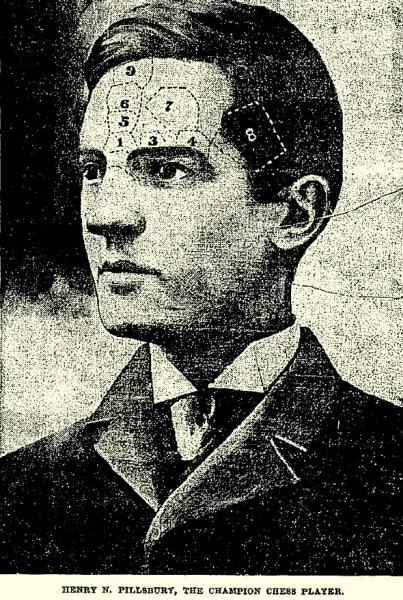
Edward Winter

See C.N. 5761.
We list a selection of articles about chess and psychology in old periodicals:
In C.N. 559 William Hartston (Cambridge, England) quoted a sentence from a 1960 paper by Félix Martí-Ibáñez:
‘To checkmate the opponent’s king in chess is equivalent to castrating and devouring him, becoming one with him in a ritual of symbolic homosexualism and cannibalistic communion, thus responding to the remnants of the infantile Oedipus complex.’
We now note a slightly earlier appearance of the passage, on page 504 of Martí-Ibáñez’s book Centaur: Essays on the History of Medical Ideas (New York, 1958). It is in an essay ‘On the Psychology of Chess’ (pages 501-508):
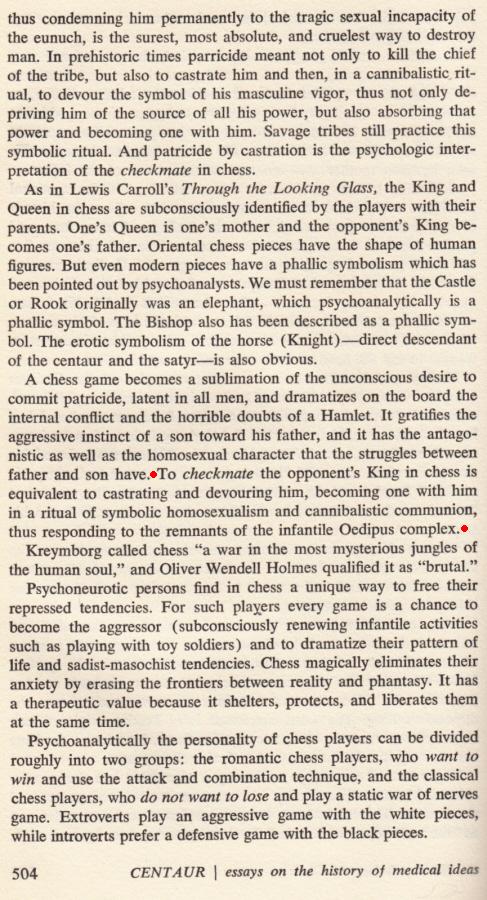
The author’s inscription in our copy:

(7456)
A very scholarly work is Jeu d’échecs et sciences humaines by Jacques Dextreit and Norbert Engel (Payot, 1981) although unfortunately it has so far made virtually no impression outside France. The chapter headings indicate the scope: 1) position du jeu d’échecs 2) jeu d’échecs et psychanalyse 3) jeu d’échecs et psychiatrie 4) jeu d’échecs et psychologie 5) jeu d’échecs et éducation 6) jeu d’échecs et sociologie 7) jeu d’échecs et écritures 8) jeu d’échecs et société. It is hard to imagine that chess writers on any of these themes will in future dare neglect this important book (which is complete with 38 pages of notes and a 14-page bibliography). The only truly weak spot is the first part of the chapter on chess and psychiatry, which is lamentably superficial in recounting the old masters’ (real or imagined) quirks.
(754)
John Blackstone (Las Vegas, NV, USA) notes pages 189-192 of Introduction to Psychology by Robert M. Yerkes (New York, 1911):
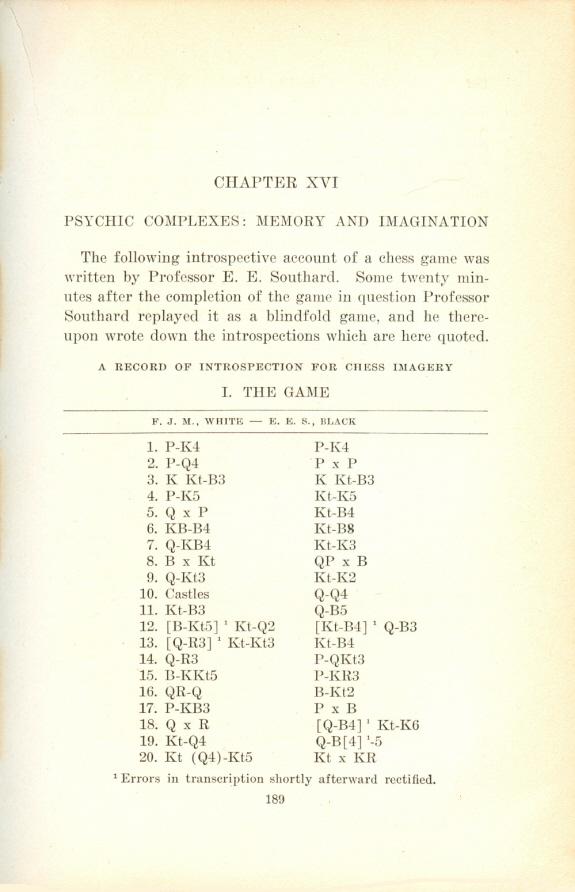
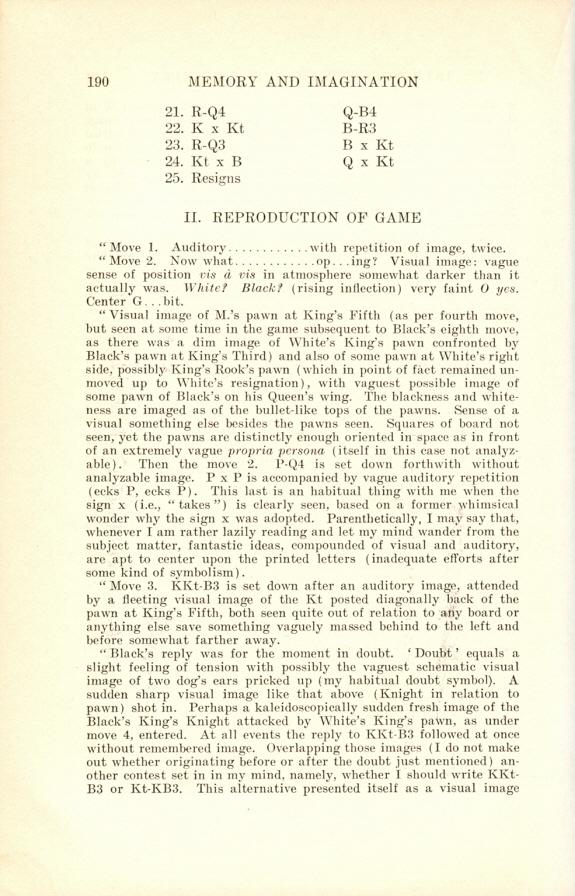
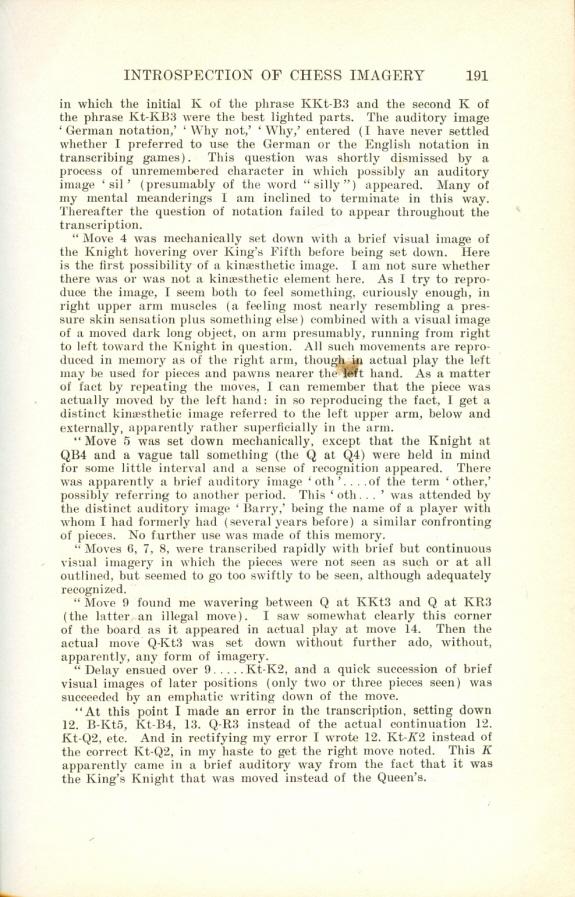
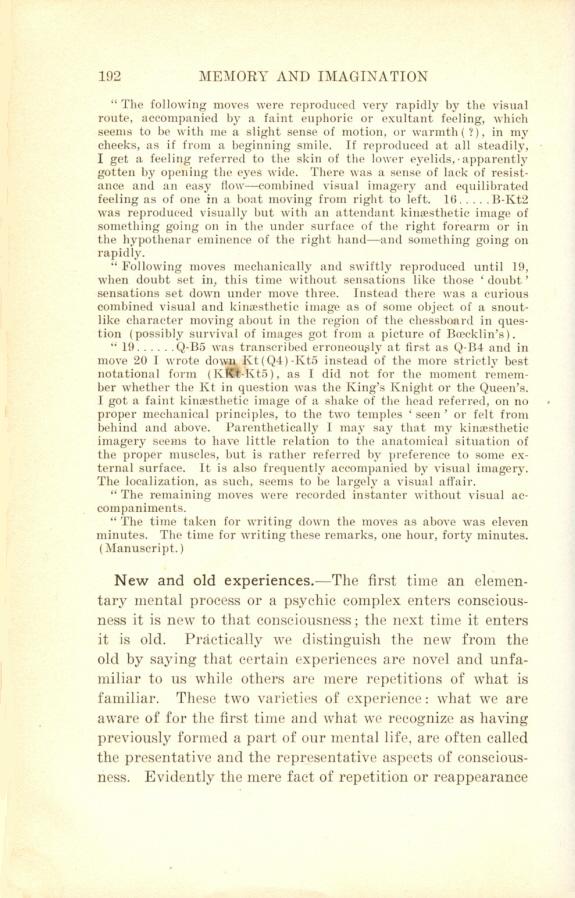
The game-score is: 1 e4 e5 2 d4 exd4 3 Nf3 Nf6 4 e5 Ne4 5 Qxd4 Nc5 6 Bc4 Nc6 7 Qf4 Ne6 8 Bxe6 dxe6 9 Qg3 Ne7 10 O-O Qd5 11 Nc3 Qc4 12 Nd2 Qc6 13 Nb3 Nf5 14 Qh3 b6 15 Bg5 h6
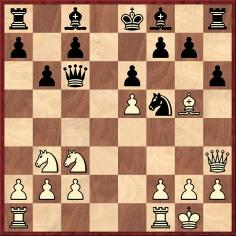
16 Rad1 Bb7 17 f3 hxg5 18 Qxh8 Ne3 19 Nd4 Qc4 20 Ndb5 Nxf1 21 Rd4 Qc5 22 Kxf1 Ba6 23 Rd3 Bxb5 24 Nxb5 Qxb5 25 White resigns.
More information on the game is sought. An immediate question is whether E.E. Southard’s opponent, ‘F.J.M.’, was Frank James Marshall.
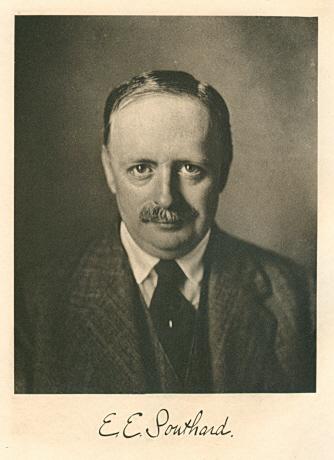
Elmer Ernest Southard (1876-1920)
(6350)
Olimpiu G. Urcan (Singapore) has supplied an article by Gerald Abrahams from pages 743-744 of The Listener, 27 October 1960:
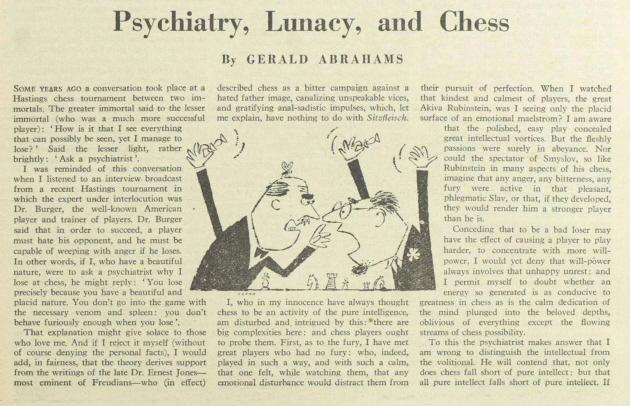
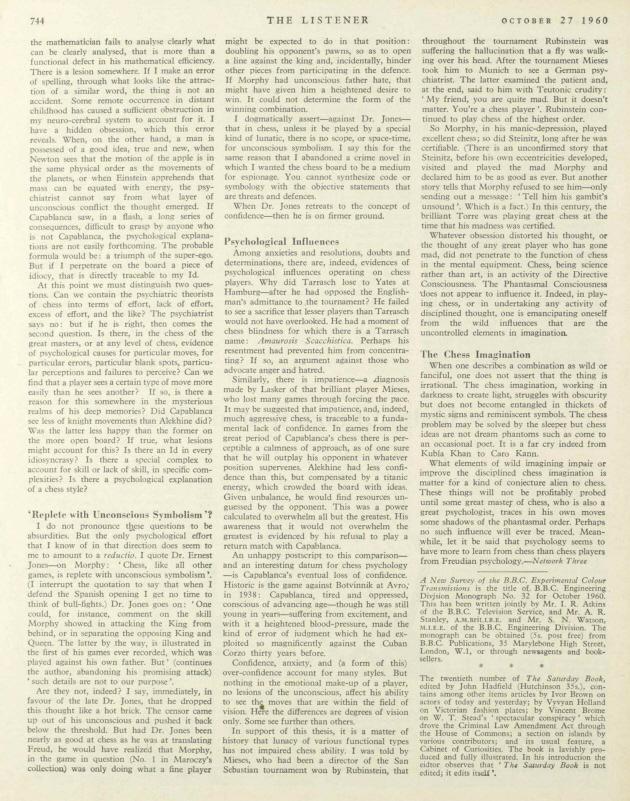
The text is markedly different from the article of the same title reproduced on pages 26-36 of Abrahams’ book Not Only Chess (London, 1974).
(8139)
A remark by C.J.S. Purdy:
‘Against a wary chessplayer the possibilities of applied psychology by an opponent are very limited. The real psychological opponent of every player is himself.’
Source: an article entitled ‘Psychology in Chess’ in Chess World, November 1957, pages 230-232.
(10193)
Below is a remark by G.H. Diggle from an article in the December 1981 Newsflash which was reproduced on page 78 of Chess Characters (Geneva, 1984). See too C.N. 7805.
‘Sixty years ago there were dotted around the provinces (either in small struggling clubs or once a week in “private house soirées”) players with only each other’s chess intellects to feed on who would loyally stick to the game without improving one iota through whole decades. ... Many of them were characters of as great psychological interest as a Fischer or a Korchnoi; for to imagine that “psychological motifs” and whatnot are the exclusive monopoly of grandmasters is to fall into the snobbish fallacy of the Sergeant Major who (when a poor Private reported sick with a “pain in the abdomen”) roared at him: “You ’ave a stummick! Only orficers has abdomens!’
(11166)
Pages 25-26 of the Magazine Section of the Sunday Times, 26 November 1961 had an article entitled ‘The Mind of the Russians’ by Lord Taylor, introduced as follows:
‘For generations the Russians have been the great enigma: the Revolution has shrouded their personality still more. Lord Taylor, psychiatrist and politician, here uses the techniques of modern scientific analysis to disentangle their complex make-up.’
Page 26 had this text:
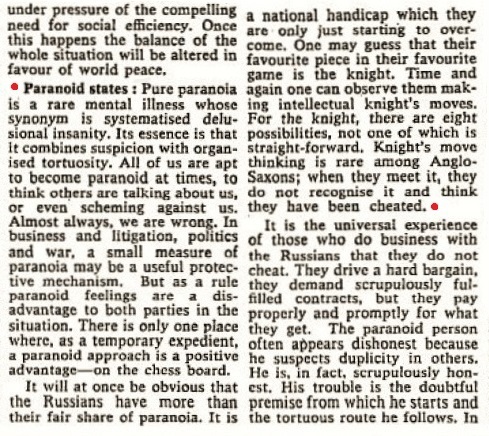
Nowadays, one could expect immediate reports that ‘furious’ readers ‘took to Twitter’ to ‘shut down’ Lord Taylor, but CHESS held back for nearly nine months:
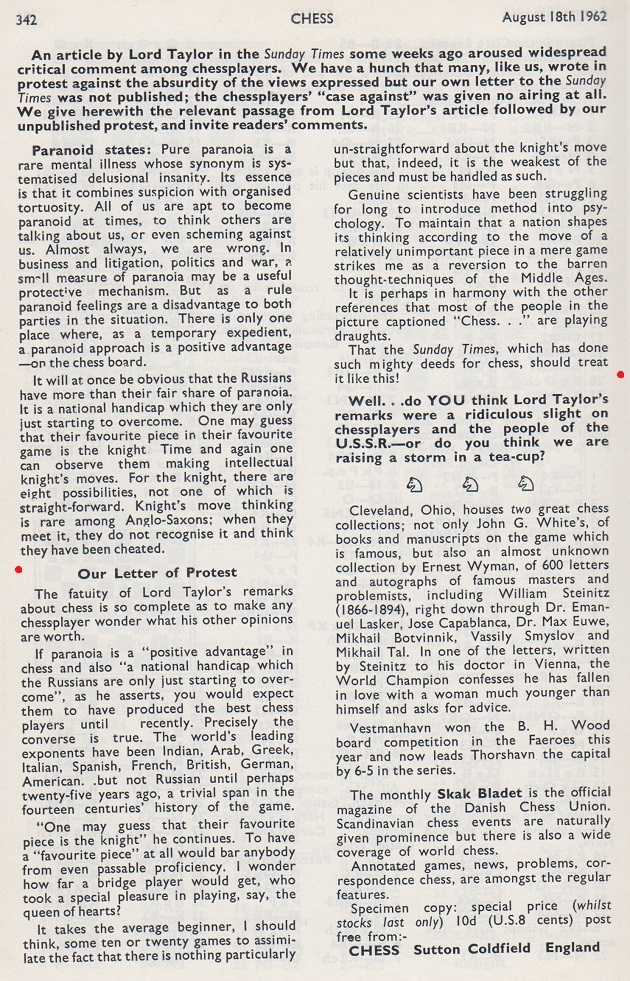
After another long wait, CHESS readers were allowed to chime in, on pages 137-138 of the February 1963 issue. One sentence from the heading:
‘Many letters received, if printed, would have landed us in the law courts.’
The tardy publication of the original feature in CHESS and the heading’s reference to ‘the Sunday Times some weeks ago’ have resulted in Lord Taylor’s article being dated 1962, rather than 1961, by a number of writers. See, for instance, page 43 of Soviet Chess by D.J. Richards (Oxford, 1965).
(11229)
Much has been written about Emanuel Lasker and psychology at the chess board; see, for instance, pages 3-25 of Winning with Chess Psychology by Pal Benko and Burt Hochberg (New York, 1991). Réti’s observations on Lasker in Masters of the Chess Board are well known, but when did public discussion begin of Lasker’s ‘psychological’ approach to the game?
Alekhine made some notable comments about chess psychology, including a reference to Lasker, on page 150 of his book Das New Yorker Schachturnier 1927 (Berlin, 1928):
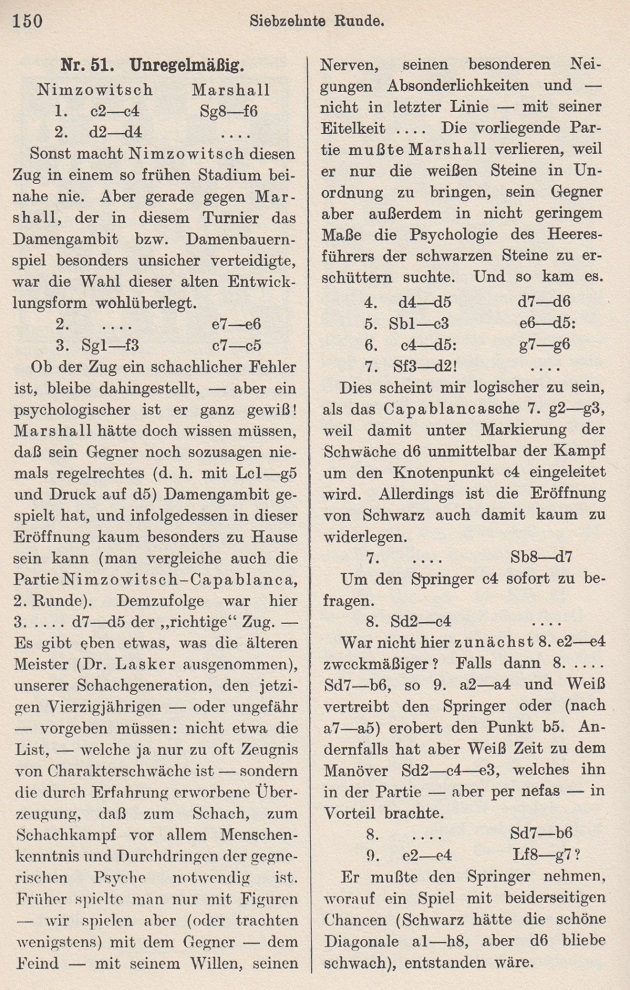
Few topics lend themselves so readily to waffle as does ‘chess psychology’. (C.N. 5616)
See too Reuben Fine, Chess and Psychology and Chess and Insanity.
To the Chess Notes main page.
To the Archives for other feature articles.
Copyright: Edward Winter. All rights reserved.